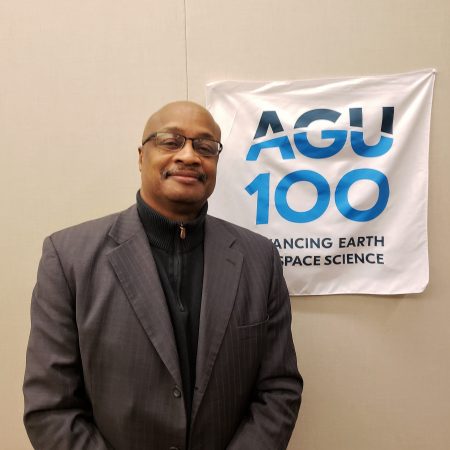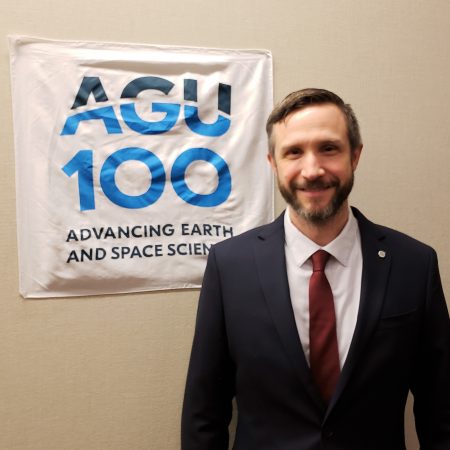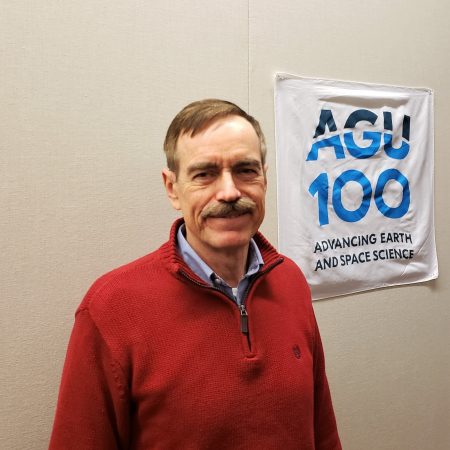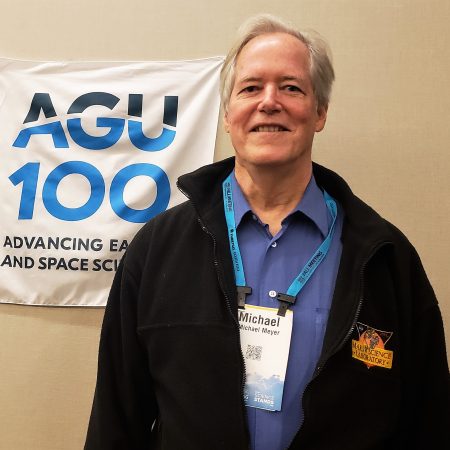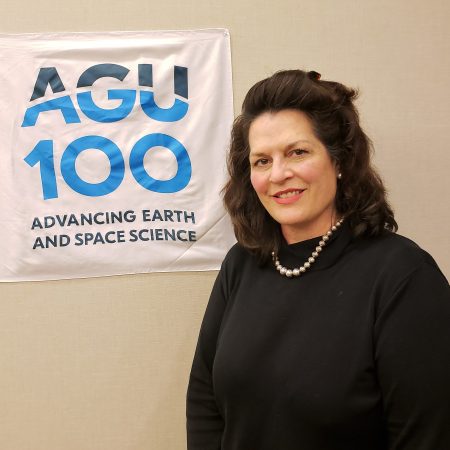Refine
Date Range Clear
Recorded by Clear
Keywords Clear
- volcanolgy 61
- Venus 61
- mars 61
- Future 61
- NASA 61
- future of science 61
- #AGU 60
- #AGU100 58
- discovery 37
- Advice 15
- planetary 12
- career path 11
- data 9
- 173 more
Partnerships Clear
- No matching terms.
Organizations Clear
- American Geophysical Union 14
- National Aeronautics and Space Administration 7
- Ameican Geophysican Union 1
- American Geophysican Union 1
- The American Geophysical Union 1
Places Clear
Languages Clear
- No matching terms.
Initiatives Clear
- No matching terms.
Glenn Orton is so deep in Jupiter mission information that he gets envious when he’s not involved in a space project studying the gas giant. The senior research scientist at the NASA Jet Propulsion Laboratory studies the composition and structure...
Miguel Román, a Physical researcher Scientist at NASA's Goddard Space Flight Center, shares his journey from his childhood in San Juan, Puerto Rico to NASA. Seeing the impacts of hurricanes and urban growth where he grew up, and the practical...
David Young, Director of Science at NASA Langley Research Center, discusses his life's work studying the earth's climate. After an early interest in astrophysics, he focused in on earth science due to his desire to do research to help humans....
Woody Turner, the program scientist for biological diversity and manager for ecological forecasting programs at NASA, and one of the few people in the world who directly harness the power of space to solve a whale of a problem –...
While Patrick Taylor spends a huge chunk of his time in the clouds, his work has nothing to do with daydreaming. The Research scientist at NASA’s Langley Research Center is working on understanding more about the role of clouds in...
Lori Glaze, Acting Director of the Planetary Science Division at NASA Headquarters, works with everything from understanding asteroid trajectories and material make up to the InSight mission which recently landed a rover on Mars. It’s no exaggeration to say Lori...
Daniel Minguez, a geophysicist for Chevron, helps create new geologic models of the earth’s layers, trying “to build geologic stories for how different geologic elements got there.” Daniel discusses his work which focuses on boring techniques and navigating plate tectonics....
The start of a fruitful career for Richard Eckman was being on a team which discovered that the stratosphere and ozone varied in relation to the sun’s 27-day rotation. Eckman, who now works with NASA’s Atmospheric Composition Modeling and Analysis...
Michael Freilich, Director of NASA's Earth Science Division, shares about his life studying the oceans and Earth as a system. While still in his high school's oceanography club, he started exploring a question about how waves move that later became...
Louise Prockter knows a thing or two about logistics and planning. When the first image of the unseen hemisphere of Mercury popped onto the screen during a flyby mission, her first thought was, "oh thank God, it's in the middle...
As a child, Luke Oman was always looking out the window. Today, he works on atmospheric processing for NASA. How do volcanic eruptions affect everyday life? What happens when sulfur dioxide gases from volcanoes interact with sulfate aerosol and stay...
Sandra Cauffman was told growing up in Costa Rica that she couldn’t be an electrical engineer because she was a woman. Decades into a career which has largely involved getting her hands dirty building instruments to fix on spacecraft, the...
How can scientists tell the story of science so that the public listens and understands? Dwayne Brown is the Senior Communication Officer for the Science Directorate at NASA and works with hundreds of scientists to communicate their ideas on television,...
Clouds are among the most unpredictable components of climate models. But Norman Loeb is working hard to sort out the shape of cloud patterns in order to improve the accuracy of long-term weather predictions. As far as understanding how all...
Putting up tall PVC pipes with pointy sensors to measure electrical fields in an approaching lightning storm may seem reckless, but it’s all part of the job for Timothy Lang. The NASA research scientist spends a lot of time in...
Jack Kaye, associate director for research at NASA's Earth Science Division, discuss his origins as a chemist and earth scientist, and how he was recruited to Goddard to be a chemist among meteorologists. "My boss would advertise me as his...
Jacob Bleacher has spent a great deal of time preparing for Mars and the moon, even though he has never left the Earth’s orbit. The research scientist at Goddard Space Flight Center is currently on detail at NASA Headquarters as...
George Huffman calls himself a classic weather person, in part because by the fourth grade in North Central Ohio, he already was excited about the prospect that you could make a job studying weather. At the NASA Goddard Space Flight...
Amber Soja’s career is on fire. The resident at NASA’s Langley Research Center studies fire regimes and how they are being affected by climate change. “Every fire season is worse,” she says, adding that the changing fire regime is proof...
Glenn Orton, a senior research scientist at the Jet Propulsion Laboratory, discusses his career exploring the outer Solar System that started with the Pioneer 10 and 11 missions, and extended forward to Cassini and more recently Juno. Interested in space...
Elizabeth Rampe, a mineralogist, studying Mars at the NASA Johnson Space Center, shares about her life and work. She focuses on minerals on the surface of Mars which formed from water-rock interactions, which have the potential to show billions of...
Dr. Claire Parkinson, senior scientist at NASA's Goddard Space Flight Center since 1978, discusses using satellite data to monitor sea ice in the Arctic and Antarctic and serving as project scientist for the NASA satellite Aqua, which makes measurements of...
Brian Day, of NASA’s Solar System Exploration Virtual Institute, leads a group of scientists in visualization and analysis of spacecraft data. Brian was taught that there’s no water on the moon, there’s no atmosphere on the moon, and the moon...
Michael Meyer, NASA's Chief Scientist for the Mars Exploration Program, talks about his life and work in science. As a teenager working as a deckhand on a treasure diving boat in Florida, he was hired to replace some fired divers...
Kristen Erickson, Director of science engagements and partnership, recently helmed NASA’s efforts to involve over 154 million adult Americans with direct participation with the 2017 total eclipse – the largest engagement effort in NASA history. But in her more than...




!["Something I learn today is something that [could help] society tomorrow." an interview with Patrick Taylor](https://archive.storycorps.org/uploads/2019/02/181211_PatrickTaylor-450x450.jpg)



!["I joined an Oceanography club & actually asked the question that ended up [being] my thesis." an interview with Michael Freilich](https://archive.storycorps.org/uploads/2019/02/181212_Freilich-450x450.jpg)



